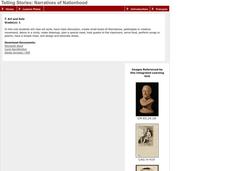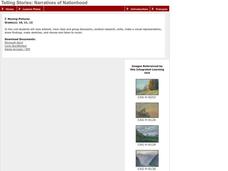West Contra Costa Unified School District
The Power of Ten: Building a Magnitude Model
Add visual representation to teaching place value with a magnitude model. Using adding machine tape, pupils build a linear place value strip from 1 to 100.
EngageNY
Inscribed Angle Theorem and Its Applications
Inscribed angles are central to the lesson. Young mathematicians build upon concepts learned in the previous lesson and formalize the Inscribed Angle Theorem relating inscribed and central angles. The lesson then guides learners to prove...
National Institute of Open Schooling
Biomolecules
An informative lesson has learners read about, discuss, and study the classification, structure and importance of the following biomolecules: carbohydrates, proteins, lipids, nucleic acids, and enzymes.
McGraw Hill
Cosmology
Explore the birth and possible death of the universe. An interactive simulation allows learners to manipulate the Hubble Constant to model the expansion of the universe from birth. Varying the constant provides different scenarios for...
Bill of Rights Institute
Interstate Commerce and the Constitution
Who had power over trade in the early days of the United States? Who has power now? Viewers investigate the Commerce Clause of the United States Constitution. Using an AP Exam review video, learners examine issues surrounding authority...
State Bar of Texas
Marbury v. Madison
Who has the final say in matters dealing with the rules under the United States Constitution? The case Marbury v. Madison brings to light the issue of judicial review. Learners investigate the Supreme Court's opinion in the case with a...
Meadows Center for Preventing Educational Risk, University of Texas at Austin
Lesson 8 - Open Syllables
Just like scholars plug something in to close a circuit, they must plug a consonant onto a word to make closed syllables. Help learners distinguish between open and closed syllables with a series of activities that emphasize open...
New York State Education Department
Global History and Geography Examination: January 2010
Agriculture was more revolutionary than some might think. Using a primary source set—including photos of artifacts from Mesopotamia and an amusing comic—learners consider the impacts of the neolithic, agricultural, and green revolutions....
EngageNY
Qualities of a Strong Literary Essay
Put it all into words. Scholars work toward writing an argumentative essay. They begin by examining and marking strong words in Are We Medieval? A Literary Argument Essay Prompt. Learners then use Qualities of a Strong Literary Argument...
Perkins School for the Blind
Making Choices
Here is an excellent and well-developed lesson intended to promote choice-making skills for learners with visual impairment and intellectual disabilities. It fosters choice-making skills through a soft version of discrete trial training,...
Perkins School for the Blind
Creating a 3-D Model of a Plant Life
Instructing blind or visually impaired learners means you need to make symbolic tactile representations of various processes to provide as much input as possible. But wouldn't it be even better to have your learners make the models...
AGSSS
World Regions
Help your learners to visualize where historical events have taken place around the globe with a map that details the major regions of the seven continents.
Curated OER
Growing Learners: A Multi-Disciplinary Approach to Investigating Plants and Flowers
Engage young scientists in these inquiry-based lesson ideas to spring into learning about nature.
Curated OER
Common Core Technology for K-5 Learners
K-5 teachers can blend fun and creativity into language arts curriculum when Common Core technology is involved.
Perkins School for the Blind
Beginning Map Skills
Maps can be so much fun, they help you understand spatial relationships, distance between objects, and can foster direction skills. Budding cartographers with visual impairments use the Wheatley Tactile Diagramming Kit to create their...
Curated OER
Lesson: Nikhil Chopra: Performing Memory
Film imitates life; that's what they say. Using performance theory to tie the lesson together, learners attempt to understand memory and daily rituals as seen in art, film, and life. They read two chapters from the book, watch the...
Curated OER
When Art's a Craft
What would it be like to restore modern works of art? By acting as modern art conservators, learners assess the first-hand difficulties faced in restoration efforts. In addition, they create modern art pieces from random materials. Then,...
Curated OER
The Body Talks
Young historians examine the gestures of human subjects represented in Mannerist, Baroque and Renaissance paintings. After they play charades and attempt to match dialogue with body language, learners create a drawing that...
Curated OER
Art and Sole
A series of four lessons encourages learners to engage in all sorts of artistic activities. They participate in creative movement, serve food, sing songs, recite poems, and create a bust of themselves. What a fun and exciting series of...
Curated OER
Moving Pictures
An ambitious series of lessons await your high schoolers. In them, learners view many pieces of art that depict weather patterns. Pupils explore the use of rhythm and movement in the pieces and strive to create their own piece of art in...
VH1
Lesson 3: Marketing of Pop Music
Pop music and marketing are thrown into the mix to make a fun and engaging lesson. Learners listen to several pop songs and discuss the differences in musical style. They then get into groups and work together to decide how they are...
Curated OER
Cityscapes
A perfect resource for an art teacher of any grade. First, click on the resource's second tab, entitled "Activities," to find four unique grade-specific lesson all based on the theme of cityscapes. Each activity utilizes the...
Curated OER
Hot, Hot, Hot, Cold
Learners dance the image of falling snow. They move, swing, fall, and rise to music working to depict snow falling, the sun, and high/low movements. This is a well-thought out lesson that aids them in seeing movement as a form of...
Curated OER
Water, Art, and The Canadian Identity
Have your class explore the representation of water in Canadian art. This lesson plan has learners investigate the representation of water in a variety of art forms. They focus on their personal feelings about art and the topic of water....

























